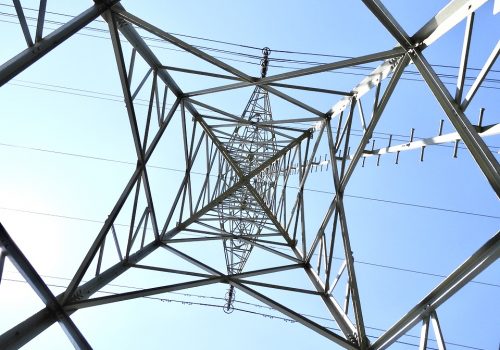As the global community continues to grapple with the coronavirus (COVID-19), the Atlantic Council is open for business. Our business, meetings, and events, however, are occurring virtually. For more information, please read an update from our President and CEO.
The global health pandemic has disrupted energy markets and investment and has shed light upon the frailty of key supply chains, including those critical to the clean energy transition. While oil markets have been especially hard hit, critical mineral supply chains integral to clean tech manufacturing have also been affected. Expert panelists discussed the national security implications of the global energy transition in the United States, as well the questions COVID-19 raises regarding US preparedness for that transition.
Event recap
On Wednesday, July 29, the Atlantic Council Global Energy Center, the Naval Postgraduate School, and the Payne Institute for Public Policy hosted a panel discussion on the clean energy-national security nexus. Dr. Daniel Nussbuam, chair of the Energy Academic Group at the Naval Post Graduate School, provided opening remarks. Col. Greg Douquet, co-director of the Veterans Advanced Energy Project and senior fellow at the Atlantic Council Global Energy Center, moderated the discussion featuring: Joe Bryan, former deputy assistant secretary of the Navy for energy and senior fellow at the Atlantic Council Global Energy Center; Sherri Goodman, former deputy undersecretary of defense (Environmental Security) and Atlantic Council board director; and Vice Admiral Dennis McGinn, former assistant secretary of the navy for energy, installations, and the environment. The panelists discussed the national security implications of operational supply chains and the importance of energy and climate resilience for the US armed forces. To conclude, Dr. Morgan Brazilian, director of the Payne Institute and professor of public policy at the Colorado School of Mines, provided closing reme, arks.
In his opening remarks, Nussbaum discussed how the COVID-19 pandemic has showcased the fragility of supply chains, including for oil and minerals crucial for the advanced energy industry. Bryan indicated that the United States is currently dependent on China for lithium ion battery manufacturing, and that US leadership needs to act in order to ensure the United States has a seat at the table. McGinn added that investment in oil infrastructure in the early 20th century helped make the United States a global power, and that similar investments should be made for advanced energy technologies. Goodman agreed, and affirmed that investment in advanced energy and supply chain management will prove increasingly important; US Congress recently included provisions in the 2021 National Defense Authorization Act to boost Department of Defense energy innovation.
The conversation then moved to the importance of energy and climate resilience for national security. Goodman explained that floods and other extreme weather events threaten vital supply chains and military infrastructure, and argued that climate proofing military installations needs to start now in order to minimize future costs. McGinn concurred, asserting that military bases provide critical capabilities downrange for national security interests. Energy resilience is growing ever more important, as grid infrastructure is under threat from both extreme weather and targeted cyberattacks. Bryan explained that identifying areas for resilience improvement needs to be the priority. Speakers noted that working with the private sector is important, as utilities and energy companies are increasingly investing in resilience; pubic-private partnerships can offer mutually beneficial solutions to problems facing both the military and utilities.
Audience questions centered around the use of advanced energy in US military operations and the energy security impact of US withdrawal from the Paris Climate Agreement. When it comes to military integration of advanced energy, Bryan was skeptical about the national security benefits of micro nuclear reactors due to their high costs, licensing difficulties, and complications with deploying them in conflict zones. McGinn shared that the military is far from utilizing hydrogen or other advanced fuels in naval vessels, but that serious work has begun at the private sector level that would impact all fuel consumers. Goodman indicated that withdrawal from the Paris Agreement could push close allies to depend more on China. Alliances and partnerships are necessary for the United States to lead on climate action: speakers agreed that rejoining the Paris Agreement would be a necessary first step. Dr. Bazilian closed the event by highlighting the importance of public research for military innovation and national security and thanked the audience and panelists for their questions and insight.
Agenda
Opening remarks by
Dr. Daniel Nussbaum
Chair, Energy Academic Group
The Naval Post Graduate School
A conversation with
Joe Bryan
Former Deputy Assistant Secretary of the Navy for Energy
Senior Fellow, Global Energy Center
Atlantic Council
Sherri Goodman
Former First Deputy Undersecretary of Defense (Environmental Security);
Board Director
Atlantic Council
Vice Admiral Dennis McGinn, USN (ret.)
Former Assistant Secretary of the Navy for Energy, Installations, and the Environment;
Advisory Council, Veterans Advanced Energy Project
Atlantic Council Global Energy Center
Moderated by
COL Greg Douquet, USMC (ret.)
Senior Fellow, Global Energy Center
Co-Director, Veterans Advanced Energy Project
Atlantic Council
Closing remarks by
Dr. Morgan Bazilian
Director, Payne Institute; Professor of Public Policy
Colorado School of Mines
Related experts
Learn more about the Veterans Advanced Energy Project

The Global Energy Center develops and promotes pragmatic and nonpartisan policy solutions designed to advance global energy security, enhance economic opportunity, and accelerate pathways to net-zero emissions.







